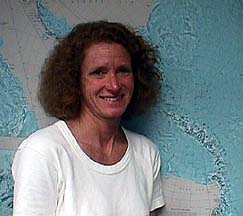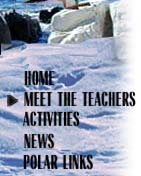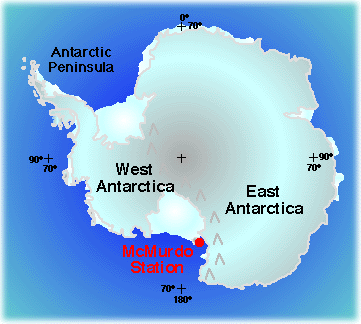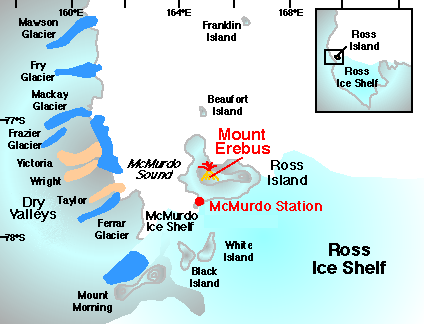




Jean's 2004 Antarctic Experience with Raytheon Polar Services:
My job of Polar Education Coordinator is a dream come true. There are two parts to my responsibilities. First I have the Polar Intern Program (PIP) which I coordinate. This year we selected 11 college interns (up from 5 last year) for a work-study experience from their universities. There are 6 boys, 5 girls, and 7 institutions represented, including the University of Puerto Rico. These fantastic kids have various jobs on station and I act as their advocate, helping them with their school projects and finding ways to get them out of town on various science projects to experience the 'real' Antarctica. That is the very entertaining part of my job, watching these students embrace this adventure, I have lots of great stories generated by their experiences, they make me laugh everyday.
Second, I have the Polar Education Program (PEP) teaching some classes here for college credit through the extension office of California State University, Fresno. This year there are 5 classes:
1. The History of Antarctica Through the Eyes of the Early Explorers. Widely popular, I have between 70 -100 show up every week, but only a handful taking it for credit.
2. Ends of the Earth. I simultaneously teach this through the University of Alaska, Fairbanks to students in outlaying areas of Alaska.
We use a conference call system twice a week for lectures/discussion, they have a textbook and do labs up there, send me their assignments. Here it is face to face. It is about the science of the poles.
3. Classroom Connections. This is where community members are pen pals for classrooms in the US. I have lots of people doing it, but
again only a handful taking it for credit. There are 60+ classrooms signed up.
4. Science Seminar. People can attend anything that has to do with the science of Antarctica, write a summary and for each 15 hours = 1
credit.
5. Teaching English as a Foreign Language. This class by popular demand, the community wants this skill so they can go round the world
on their way home and work in English schools.
I also run Travel Log Night (once a week), Antarctic Movie Night (once a week), and Culture Night (twice a month), do various presentations utilizing community members and their knowledge. I showcased a photographer and his work, a lawyer talking about legal stuff, you get the idea.
All this keeps me very busy, but it is great fun. On the other hand I doubt I will be doing this for too many more years, and be ready to turn it over to someone (hopefully another TEA), at some point.

Received undergraduate degree in Wildlife and Fisheries Biology from the
University of California at Davis, and a Teaching Credential from Montana
State University at Bozeman. Worked with the California Department of Fish
and Game and the California Department of Food and Agriculture before
starting my teaching career in 1985. Spent 8 years at the high school
level, 2 at the middle school level and two years teaching overseas in
Florence, Italy.
Hobbies include distance running, hiking, gardening, tennis, skiing and
travel.

Gas Collection and Analysis at the Summit of Mt Erebus,an Active Antarctic Volcano
Dr. Phillip R. Kyle, New Mexico Institute of Mining and Technology
Mt. Erebus Volcano
Observatory (MEVO)
The project will be based at 11,000 ft. near the rim of an active volcano
close to the Ross Ice Shelf in Antarctica. Mt. Erebus has a permanent lava
lake in the crater and has small eruptions daily. The team will be
gathering gas samples and taking seismic readings.








